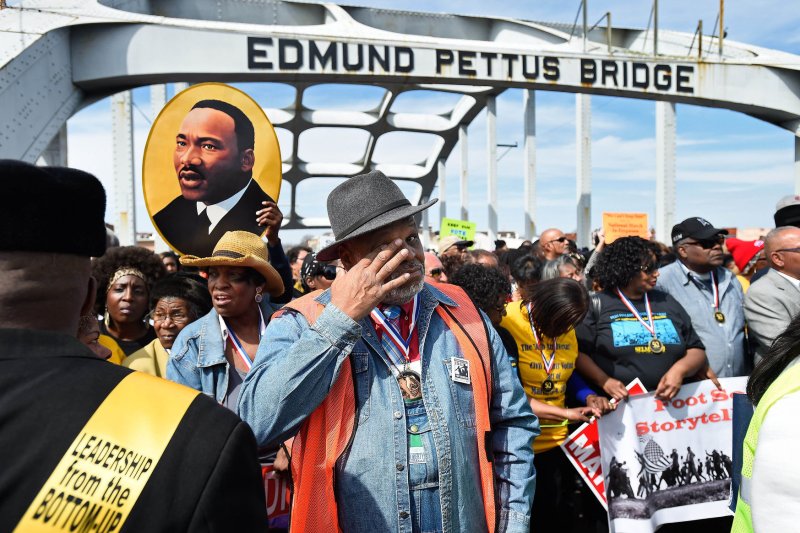1 of 7 | Spyra Gordon, one of the original marchers, wipes his eyes after ceremoniously crossing the historic Edmund Pettus Bridge with thousands of others to remember the violent clash between civil rights activists and police during the March on Selma 50 years ago in Selma, Alabama, March 8, 2015. Photo by David Tulis/UPI |
License Photo
SELMA, Ala., March 9 (UPI) -- The commemoration of the 1965 Selma-to-Montgomery Voting Rights March came days after the Justice Department's Ferguson, Mo., report on apparent police racism -- highlighting the current race issues the nation still faces.
On Saturday, President Barack Obama praised those who marched for civil rights from Selma 50 years ago, saying they gave "courage to millions." He also discussed current racial issues the United States, but said much has improved.
"What happened in Ferguson may not be unique, but it's no longer endemic," Obama said. "It's no longer sanctioned by law or custom, and before the civil rights movement, it most surely was."
Attorney General Eric Holder said Sunday that voting is now being threatened by state laws that are restricting people's access, usually with unsupported claims of preventing voter fraud.
"It has been clear in recent years that fair and free access to the franchise is still, in some areas, under siege," Holder said.
On March 6, 1965, former Alabama Gov. George C. Wallace, who denied voting rights to African Americans in the state, announced he would not let the five-day, 54-mile long march carry on.
Diane Nash, a key civil rights figure who worked with Dr. Martin Luther King Jr. and attended the original Selma march, refused to march as part of the anniversary celebration because former President George W. Bush was present.
"I think the Selma movement was about nonviolence and peace and democracy," she said. "George Bush stands for just the opposite. For violence and war and stolen elections."
"I think that George Bush's presence is an insult to me and to people who really do believe in non-violence," Nash added.
Charles J. Dean, Alabama native and writer for Alabama Media Group, wrote that this year's Selma commemoration begins to show that the event is no longer seen as a racial or partisan issue.
"I think for too long too many whites have seen Selma as something African-Americans celebrate and the whites who come are all liberal Democrats," Dean wrote. "That was not true this Saturday or Sunday... More Republican members from Alabama, and from other states, came than I can ever recall... and all of that is good not because Selma needs some kind of white validation but because Selma belongs to all of us."















